Barron v baltimore 1833 - Study guides, Class notes & Summaries
Looking for the best study guides, study notes and summaries about Barron v baltimore 1833? On this page you'll find 43 study documents about Barron v baltimore 1833.
Page 2 out of 43 results
Sort by
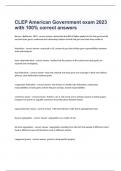
-
CLEP American Government exam 2023 with 100% correct answers
- Exam (elaborations) • 29 pages • 2023
-
- $17.49
- + learn more
Barron v Baltimore, 1833 - correct answer -determind that Bill of Rights applied to the Fed govt and did not bind state govts, confirmed dual citizenship (citizens of both fed govt and state they reside in) federalism - correct answer -practiced in US, system of govt that divides govt responsibilities between state and fed govts layer-cake federalism - correct answer -implies that the powers of the central and state govts are separate but overlapping dual federalism - correct answer -id...
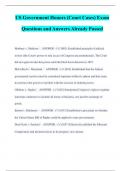
-
US Government Honors (Court Cases) Exam Questions and Answers Already Passed
- Exam (elaborations) • 6 pages • 2024
-
- $11.99
- + learn more
Marbury v. Madison - ANSWER (1803) Established principle of judicial review (the Court's power to rule an act of Congress unconstitutional). The Court did not again invoke this power until the Dred Scott decision in 1857. McCulloch v. Maryland - ANSWER (1819) Established that the federal government's power must be considered supreme within its sphere and that states do not have the power to interfere with the exercise of federal powers. Gibbons v. Ogden - ANSWER (1824) Interpreted Congre...
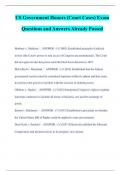
-
US Government Honors (Court Cases) Exam Questions and Answers Already Passed
- Exam (elaborations) • 6 pages • 2023
-
- $11.49
- + learn more
US Government Honors (Court Cases) Exam Questions and Answers Already Passed Marbury v. Madison - ANSWER (1803) Established principle of judicial review (the Court's power to rule an act of Congress unconstitutional). The Court did not again invoke this power until the Dred Scott decision in 1857. McCulloch v. Maryland - ANSWER (1819) Established that the federal government's power must be considered supreme within its sphere and that states do not have the power to interfere with the e...
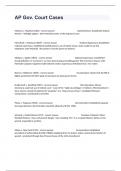
-
AP Gov. Court Cases Complete Actual Exam Question With Correct Answers.
- Exam (elaborations) • 5 pages • 2024
-
Available in package deal
-
- $12.99
- + learn more
Marbury v. Madison (1803) - correct answer Judicial Review; Established Judicial Review; "midnight judges"; John Marshall; power of the Supreme Court McCullcoh v. Maryland (1819) - correct answer National Supremacy; Established national supremacy; established implied powers; use of elastic clause; state unable to tax fed. Institution; John Marshall; "the power to tax the power to destroy" Gibbons v....
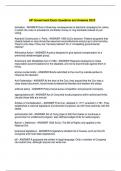
-
AP Government Exam Questions and Answers 2023
- Exam (elaborations) • 29 pages • 2023
-
- $10.00
- + learn more
activation - ANSWER One of three key consequences of electoral campaigns for voters, in which the voter is activated to contribute money or ring doorbells instead of just voting. Adarand Constructors v. Peña - ANSWER 1995 SuCo decision: Federal programs that classify based on race should be assumed unconstitutional and put up to strict scrutiny. They're only okay if they are "narrowly tailored" for a "compelling governmental interest." Affirmative Action - ANSWER A policy designed to...

-
Test Bank For Criminal Law 7th Edition by John M. Scheb
- Exam (elaborations) • 208 pages • 2023
-
- $30.04
- + learn more
EXAM QUESTIONS CHAPTER 3: CONSTITUTIONAL LIMITATIONS ON THE PROHIBITION OF CRIMINAL CONDUCT TRUE/FALSE: 1. In terms of the criminal law, by far the most significant of Congress’s enumerated powers is the power to regulate interstate commerce. ANS: T REF: 61 LO: 2 2. The First Amendment to the U.S. Constitution prohibits Congress from adopting bills of attainder. ANS: F REF: 62 LO: 3 3. A legislative act convicting a person of a crime without benefit of a trial is called an ex post facto...

-
Test Bank For Criminal Justice in America 6th internationalEdition By George F. Cole
- Exam (elaborations) • 194 pages • 2023
-
- $32.00
- + learn more
TEST BANK Criminal Justice and the Rule of Law MULTIPLE CHOICE 1. If victims wish to recoup their losses following a crime, they must rely on: a. substantive criminal law b. procedural criminal law c. real estate law d. civil law e. cooperative law ANS: D REF: Page 69 OBJ: 3-1 2. The definitions of crimes and people eligible for punishment are spelled out in: a. procedural criminal law b. substantive criminal law c. constitutional criminal law Chapter 3 d. fundamental criminal law ...
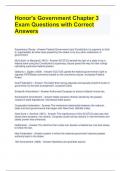
-
Honor's Government Chapter 3 Exam Questions with Correct Answers
- Exam (elaborations) • 2 pages • 2023
-
Available in package deal
-
- $13.49
- + learn more
Honor's Government Chapter 3 Exam Questions with Correct Answers Supremacy Clause - Answer-Federal Government (and Constitution) is supreme to (that is, supersedes) all other laws passed by the states or by any other subdivision of government. McCulloch vs Maryland (1819) - Answer-SCOTUS denied the right of a state to tax a federal bank using the Constitution's supremacy clause paved the way for later rulings upholding expansive federal powers. Gibbons v. Ogden (1824) - Answer-SCOTUS u...
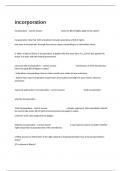
-
incorporation Assessment Questions And Answers Verified Solutions.
- Exam (elaborations) • 3 pages • 2024
-
Available in package deal
-
- $12.99
- + learn more
incorporation - correct answer Does the Bill of Rights apply to the states? Incorporation: idea that 14th amendment includes provisions of bill of rights; two ways to incorporate: through due process clause and privileges or immunities clause; b. When a right or liberty is incorporated, it applies with the same force (i.e., jot-for-jot) against the states as it does with the federal government. Concerns with incorporation: - correct answer ...
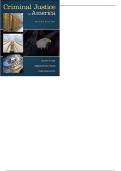
-
Test Bank For Criminal Justice in America 8th Edition by George F. Cole
- Exam (elaborations) • 451 pages • 2023
-
- $32.00
- + learn more
True / False 1. In the United States, criminal laws dictate punishments for those who violate the terms of a contract with another individual. ANSWER: REFERENCES: LEARNING OBJECTIVES: KEYWORDS: a. True b. False False Foundations of Criminal Law CJIA.COSM.16.03.01 - Identify the bases and sources of American criminal law. Bloom’s: Remember 2. In Robinson v. California (1962), the Supreme Court struck down a law that made it a crime to be addicted to drugs. a. True ANSWER: REFERENCES: ...

How much did you already spend on Stuvia? Imagine there are plenty more of you out there paying for study notes, but this time YOU are the seller. Ka-ching! Discover all about earning on Stuvia


